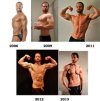HST_Rihad
Active Member
Yup, I had hypoglycemia a couple of years ago after a period of SD and coming to work at 75% of 10 reps in squats, bench, deads. Suddenly I started feeling dark circles in front of my eyes and feeling kind of dizzy, and I turned white. Sat down on a bench for about 5 minutes, then thought I was fine to go on with my training, stood up, then thought I wasn't fine just yet, went over to the gym desk, leaned my elbows over the desk as if interested in the nutritional supplements being offered... and next thing I remember is me lying on the floor face up and some dude slapping me on my cheeks.Have you ever carb depleted before? Do you know how difficult it is?
Had I eaten some potatoes, or some other sort of fast carbs prior to training, this wouldn't have happened.
Last edited:



